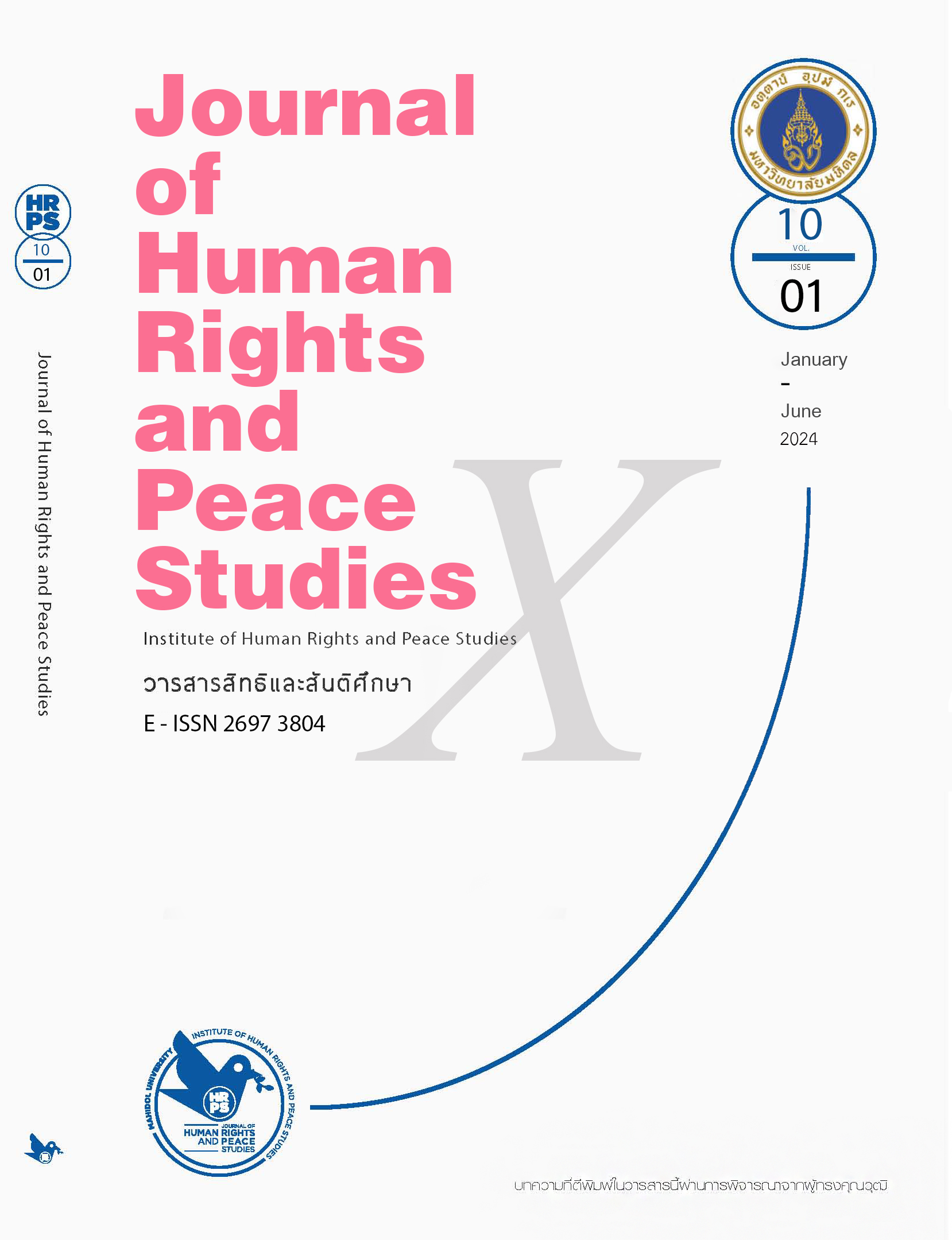Charting History: The Influence of Malay Muslim Elites in Political Mobilization and the Democratic Movement in Thailand's Deep South
Main Article Content
Abstract
This article presents the changes of Thai national political history over the past century and their impact on the political landscape in Thailand's three southernmost provinces. The objective is to illustrate the political connections between these provinces and the center. Studying these connections will enhance and enlarge our understanding of the conflicts in Thailand's Deep South. Although elections were held occasionally in Thailand between the 1950s and 1980s, more than half were corrupted by military rulers’ abuses of power, not only abusing electoral processes, but also intimidating those representatives from the Deep South whom they perceived as a potential threat to national security. Many prominent Malay Muslim representatives, such as Haji Sulong, Haji Ameen, and Siddik Sharif, who were highly respected by their electorates, were often seen as separatists’ intent on undermining and destabilizing the Thai government. This article suggests that the frequent military coups in Bangkok fomented conflict in the Deep South. It also examines Malay Muslim political candidates and their election campaigns under military rule, particularly their methods of managing campaigns to circumvent conflicts.
This article argues that within a dominant nationalistic Thai state, individuals acting in isolation face immense challenges; protest alone cannot succeed. Even if solo actors represent broader perspectives or larger movements, their visibility makes them easier targets for governmental surveillance and action.
Article Details

This work is licensed under a Creative Commons Attribution-NonCommercial-NoDerivatives 4.0 International License.
The views, opinions, and pictures expressed in this journal are those of the authors and do not necessarily reflect the opinions and viewpoints of the editor and the editorial board. All rights are reserved by the authors and the Institute of Human Rights and Peace Studies of Mahidol University. No part of this journal may be reproduced, stored in a retrieval system, or transmitted in any form or by any means without the prior permission in writing from the journal’s editor, or as expressly permitted by law, or under terms agreed with the appropriate reprographics rights organization. Non-commercial use of information in this journal must be properly referenced.
References
Aphornsuvan, T. (2006). Khwām pen mā khō̜ng trisadee bang yǣk din dǣn nai phāk tāi khō̜ng Thai. [The origin of the territorial division theory in Southern Thailand]. East Asian Studies, Faculty of Liberal Arts, Thammasat University. (In Thai)
Aphornsuvan, T. (2008). Origins of Malay Muslim 'separatism' in Southern Thailand. In M. Montesano & P. Jory (Eds.), Thai South and Malay North: Ethnic interactions on a plural peninsula (pp. 91-123). National University of Singapore Press.
Banomyong, S. (2017, June 24). Bư̄anglang chāo Thai Mutsalim nai hētkān plīanplǣng kān pokkhrō̜ng 2475 [Thai Muslim and the 24 June 1932 revolution]. Silapawatanatam. https://www.silpa-mag.com/history/article_10214. (In Thai).
Campbell, C. (1982, April 30). Thais try to turn violent area into ‘happy south’. The New York Times. Retrieved June 2017, from http://www.nytimes.com/1982/04/30/world/thais-try-to-turn-violent-area-into-happysouth.html
Chambers, P., & Waitoolkiat, N. (2019). The role of security forces in Thailand’s deep south counter-insurgency. Asian International Studies Review, 20(1), 53-77. https://doi.org/10.16934/isr.20.1.201906.53
Che Man, W. K. (1983). Muslim elites and politics in Southern Thailand [Unpublished master's thesis]. University Sains Malaysia.
Che Man, W. K. (1990). Muslim separatism: The moros of southern Philippines and the Malays of southern Thailand. Oxford University Press.
Funston, J. (2008). Southern Thailand: The dynamic of conflict. East–West Center.
Haemindra, N. (1977). The problem of the Thai-Muslims in the four southern provinces of Thailand (part two). Journal of Southeast Asian Studies, 8(1), 85-105. https://doi.org/10.1017/S0022463400015666
Huntington, S. P. (1957). The soldier and the state: The theory and politics of civil-military relations. Belknap Press.
Kasetsiri, C. (1974). The First Phibun Government and Its Involvement in World War II. Journal of the Siam Society, 62(2), 25-88. https://thesiamsociety.org/wpcontent/uploads/1974/03/JSS_062_2d_CharnvitKasetsiri_FirstPhibunGovernmentAndInvolvementInWorldWarII.pdf
Khuntongpetch, C. (2004). Haji Sulong Abdul Kadir: Kabot...rur veraburut hǣng sī jāngwat phāk tāi [Haji Sulong Abdul Kadir: The rebellion…or the hero of the four southern provinces of Thailand]. Matichon Printing. (In Thai)
Klein, J. (2010). Democracy and conflict in Southern Thailand: A survey of the Thai electorate in Yala, Narathiwat, and Pattani. The Asia Foundation. https://asiafoundation.org/resources/pdfs/TAFThailandSouthernReport2010.pdf
Maluleem, I. (1995). Wikhrǿ khwām khatyaēng rawāng ratthabān Thai kap Mutsalim nai prathēt Thai: køranī seuksā klum Mutsalim nai khēt jangwat chāidaēn phāk tāi. [Analysis of the conflict between the Thai government and Muslims in Thailand: A case study of the Muslim group in the southern border provinces]. Islamic Academy, Bangkok. (In Thai).
McCargo, D. (2006). Thaksin and the resurgence of violence in the Thai South: Network monarchy strikes back? Critical Asian Studies, 38(1), 39-71. https://doi.org/10.1080/14672710600556429
Numnonda, T. (1978). Pibulsongkram's Thai nation-building programme during the Japanese military presence, 1941–1945. Journal of Southeast Asian Studies, 9(2), 234-247. https://www.jstor.org/stable/20062726
Ockey, J. (2008). Elections and political integration in the deep south of Thailand. In M. J. Montesano & P. Jory (Eds.), Thai South and Malay North: Ethnic interactions on a plural peninsula. (pp. 124 – 154). National University of Singapore Press.
Puaksom, D. (2008). Of a lesser brilliance: Patani historiography in contention. In M. Montesano & P. Jory (Eds.), Thai South and Malay North: Ethnic interactions on a plural peninsula. (pp. 71 – 90). National University of Singapore Press.
Stowe, J. A. (1991). Siam becomes Thailand: A story of intrigue. University of Hawaii Press.
Teeuw, A., & Wyatt, D. K. (1970). Hikayat Patani: The story of Patani. Martinus Nijhoff.
Tohmeena, D. (1979). Bantheuk panhā 4 jangwat phāk tāi pen panhā yai jing rur. [The Memoir: Is the problem of the four southernmost provinces really a big problem?] (In Thai).
Whittingham-Jones, B. (1947, October 30). Patani-Malay state outside Malaya. The Straits Times.
Wirunha, C. (2008). Buhongaraya: Prawạtisās̄tr cāk khả bxk lèā k̄hong chāw malāyū. [Buhongaraya: History from the narratives of Malay people]. Sakdhisophakarnpim. (In Thai).
Yeema, Bukoree. (2006). Nak kan muang tin changwat Pattani. [Local politician from Pattani Province]. King Prajadhipok’s Institute. (In Thai).


